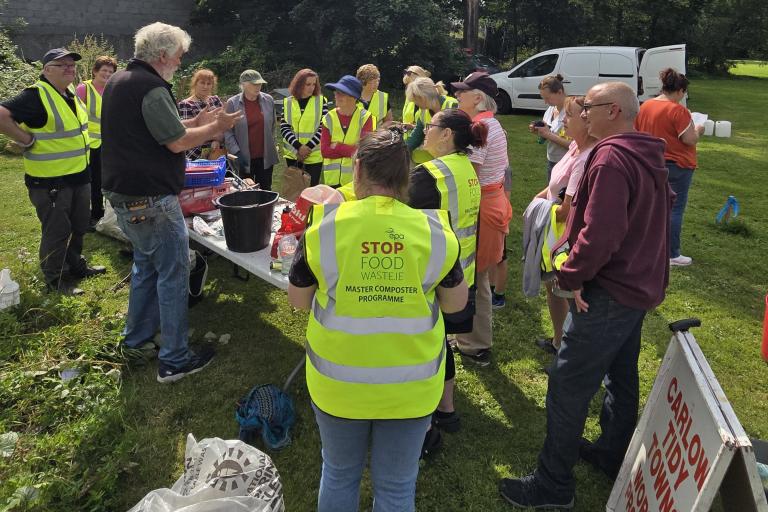
Carlow, Ireland – July 28, 2025 – A grassroots green revolution is taking root in Carlow, thanks to a dynamic partnership between Carlow County Council and Composting Ireland. This summer, 22 enthusiastic volunteers from 11 community groups came together for a transformative Master Composting course, led by renowned composting expert Craig Benton - better known as Dr Compost.
Held over four, hot July evenings at the Carlow MD Chamber, the course blended science, sustainability, and community spirit. Participants explored the full cycle of food, from waste to resource, learning how to turn kitchen scraps into nutrient-rich compost. Through hands-on demonstrations and shared experiences, they gained practical skills and a deeper understanding of how composting supports a circular economy, where nothing is wasted, and everything has value.
The initiative culminated in the creation of a dedicated Master Composting area for the Carlow Tidy Towns Group, a legacy that will serve as both a working model and an educational hub for sustainable waste management. The compost produced will be used in local group activities such as community garden, biodiversity projects, and green spaces, reinforcing the idea that what we waste can help us grow.
Building on this momentum, additional composting workshops and site builds were held with Tynock Tidy Towns, Tinryland Community Hub, Park & Tidy Towns, Bagenalstown Community Garden, Coláiste Aindriú in Bagenalstown, Carlow Irish Wheelchair Association, and Forward Steps Tullow, engaging an additional 80+ volunteers in the movement. These sessions not only taught composting techniques but also sparked conversations around food awareness, waste reduction, community resilience, and climate action.
“This initiative is a shining example of what can be achieved when communities come together with a shared vision for environmental stewardship,” said Dee Sewell, Environmental Awareness Officer. “The enthusiasm and commitment shown by the volunteers has been truly inspiring, and the new composting areas will continue to benefit County Carlow for years to come.”
The urgency of this work is underscored by the latest figures from the Environmental Protection Agency (EPA), which reveal that Irish households generated an estimated 221,000 tonnes of food waste in 2023, accounting for 26% of the national total, which costs the average household €700 per year, amounting to a staggering €1.29 billion nationally. The emissions created from food waste alone is estimated to have produced approximately 552,500 tonnes of CO₂-equivalent emissions, which is roughly the same as 92,000 round-trip flights from Dublin to New York.
The food waste journey came full circle on Saturday, 6th September when volunteers gathered once more to receive a certificate at a ceremony celebrating their achievements. Each group received free compost vouchers and certificates, recognising their contribution to a more sustainable Carlow. The event also featured a seed saving workshop with Molly Aylesbury of Bare Necessities Ireland, offering participants a chance to deepen their knowledge, network with fellow changemakers, and continue building connections that strengthen community resilience.
“Your commitment to these workshops is more than just a personal achievement, it’s a gift to our county and to our planet,” said Cllr Daniel Pender, leas-Cathaoirleach Carlow County Council, reflecting on the impact. “Food waste is a global issue, but the solutions begin locally. What’s perhaps even more inspiring is the sense of comradeship that emerged. You didn’t just learn, you connected. You built bridges between communities, generations, and perspectives. That’s the heartbeat of a resilient Carlow.”
The Master Composting programme is part of a broader effort to promote sustainable living and empower communities to take meaningful action on climate and waste issues. It aligns directly with several United Nations Sustainable Development Goals (SDGs), including SDG 11 – Sustainable Cities & Communities, SDG 12 – Responsible Consumption and Production, SDG 13 – Climate Action, SDG 4 – Quality Education and SDG 17 – Partnerships for the Goals.
Funding for this impactful initiative was made possible through the Waste Enforcement Lead Authorities under the Anti-Dumping Initiative, reinforcing the importance of collaborative efforts in tackling environmental challenges.
The initiative is a powerful reminder that local action can drive global change, even if it’s just one compost heap at a time.